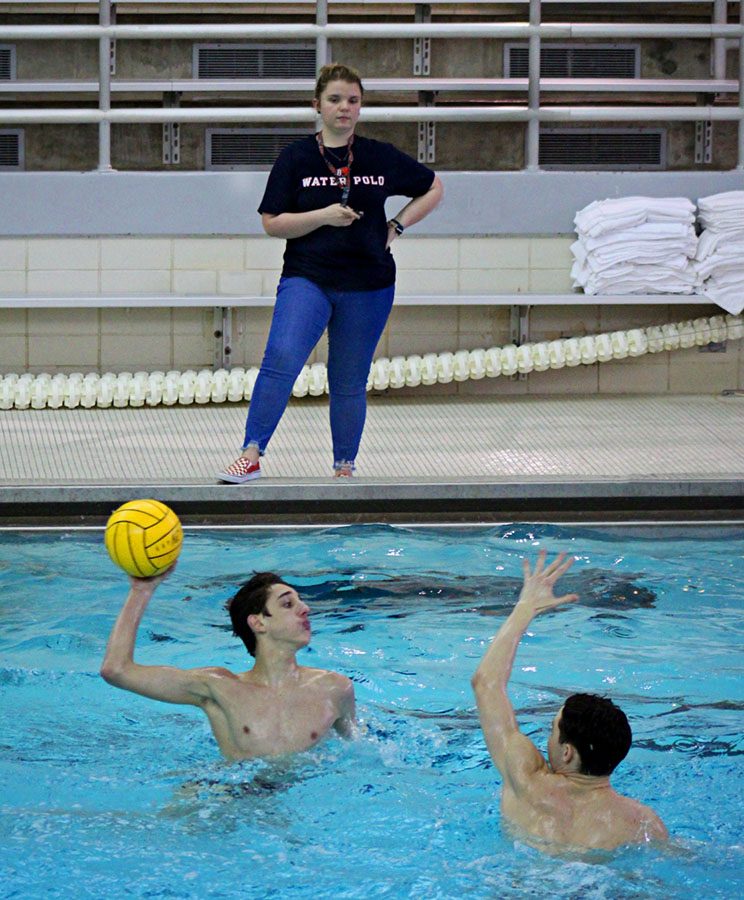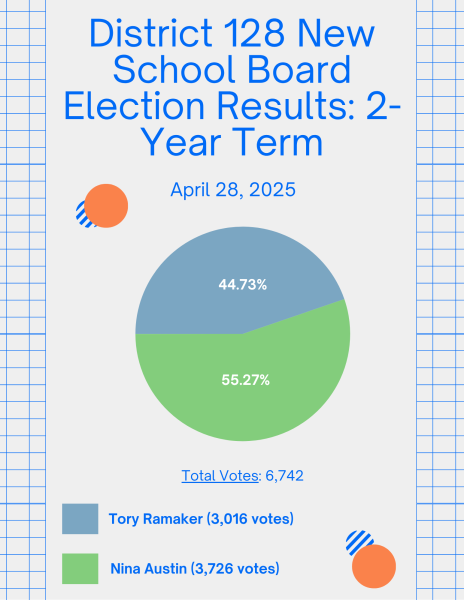She’s Got Game
LHS female coaches manning the sidelines
Ms. Kara Bosman has been coaching boys water polo at LHS for three years. She often faced discrimination towards the beginning of her coaching career by officials, who would mistake her male assistant coach as being the head coach instead.
It’s game day. You’re a female head coach and your team is warming up while you talk strategy on the sideline with your assistant coach. As the head coach, you’re prepared to greet the official. The official, however, turns to your male assistant coach under the assumption that he’s the head coach. Once again, you’re forced to assert yourself as the head coach and once again, you hear the surprise underlying their apology. You shake it off as you do every game and prepare yourself to face this again next game.
This was the reality for boys water polo coach Ms. Kara Bosman. She said that she experienced this situation in what felt like every game in her first two years of coaching. Now in her third year, most of the officials recognize her as the head coach, and she hardly ever faces this situation.
Challenges of Being a Female Coach
Only 28 percent of youth sport coaches are female, according to the Aspen Institute. That number holds true to Libertyville High School, as only 42 of 151 (28 percent) of coaching positions at the school are held by women.
One possible explanation for the lack of female coaches is society’s expectations for men and women within families. Mrs. Tiffany Owens, a gymnastics coach and biology teacher, explained that it’s difficult to be a working mom, especially when working two jobs.
Mrs. Owens has been coaching gymnastics for 30 years, but she noted that when she had young kids, it was hard to balance teaching, coaching and raising her kids. This already difficult task was made harder by the fact that she was a single mom raising young kids on her own.
“Not only was I a female coach, but for a long period, I was a single-mom female coach. In multiple schools, my administrators were very, very supportive and they would let me bring my children to practice. I’ve had different bosses and coworkers who were supportive and then I’ve had some that were not; it just depends,” she shared.
Mrs. Judi Neuberger, badminton coach and counselor, backed up these claims: “I can totally devote the time required to being an effective coach to this sport [now], whereas there were probably 15 years where I don’t think I could have been a head coach when I was raising kids.”
Mrs. Alison Reifenberg, who is an English teacher and coaches both cross country and track at LHS, is not yet at a point in her life where she has personal experience in balancing teaching, coaching and raising children. She shared, however, that she doesn’t know of a female head coach in the distance community who is also raising children.
When she does have children, she’s unsure what will happen with her coaching job.
“Even though I absolutely love coaching — it’s one of the most important parts of my day — I have no idea what will happen when I have a kid; I honestly don’t. I want to say that I’m going to do both; I’m definitely going to try,” Mrs. Reifenberg said.
Mrs. Owens has noticed that in her friends’ families, it has become more common for her to see men stay home with children while the women continue to work. In the past, she explained, it hasn’t socially been the norm for dads to stay at home, but Mrs. Owens is encouraged by this new trend, sharing that it shows the importance of communication within families. The Pew Research Center found that between 1989 and 2012, the number of stay-at-home dads in the United States doubled from one to two million.
Ms. Bosman thinks the lack of female coaches may be due to the lack of openings: “I think that coaching is one of the greatest jobs in the world. So, when people get a coaching job, they don’t leave a lot of the time. In water polo, there’s so many other teams we go up against where the coach has been in that position for decades.”
So, when coaches stay in their position for years, they not only gain experience to help them attain future jobs but they also prevent other — maybe female — coaches from holding that position.
Within Libertyville
Most coaches interviewed for this story shared that they feel welcome and supported in the Libertyville community. Mrs. Neuberger shared that she’s never felt disadvantaged because of her gender. She explained that before badminton was an IHSA sport, she felt like they were at the bottom of a totem pole but any inequality faced wasn’t due to her gender and instead the connotations that came along with badminton.
Ms. Bosman said that she has never once felt that the athletes respected her less than her male counterparts and hasn’t experienced any gender-related issues within the Libertyville community.
“In terms of Libertyville students, Libertyville parents, and Libertyville admin… I think they see value in someone who wants the best for their children. I’m a girl who coaches boys, but I know water polo and I know what hard work is,” said Ms. Bosman.
She continued: “There’s a lot of commonality that gender doesn’t matter for. I think that a coach is just someone who should be there for you, whether you’re having a good day or a bad day. It doesn’t matter the sex of the individual, and I think parents really realize that, as well as the athletes.”
More Than a Job
Despite some challenges that come with being a female coach, all of the coaches interviewed shared that their favorite thing about coaching is the relationships they form with students outside of the classroom. Mrs. Reifenberg thinks that “it’s a nice reminder that students are more than what we see for [45] minutes in our classroom. They have lives outside of school and passions that are not necessarily things that you would see in the classroom.”
Senior Alex Houser is on the soccer and cross country teams at LHS. She’s had the experience of having both male and female coaches, and shared that she finds it easier to connect with a female coach.
“There’s always going to be a little bit of a stronger connection between a girl team and a girl coach, and I think that kind of displays across the way they communicate,” she said.
For example, the strong connection formed between a coach and her players may allow athletes to feel comfortable sharing personal issues. Houser has had experience with this: “I’ve never felt comfortable talking to the guy coach, where, if it was a girl coach, you always feel a little more comfortable.”
Mrs. Reifenberg made a point to hire a solely female coaching staff. She emphasized that this decision wasn’t to spite men but instead to show her athletes that women are capable of being in leadership positions.
“I want the girls on the team to understand that they can do things. They can be in leadership roles; they can coach; they can do all different types of things — whatever they really set their mind to and are passionate about.”
She continued: “I think that the way we communicate with each other is really important because it’s honestly mostly been women in my life, and the most important women who usually support me in everything I do, they’re really the ones who are saying that [balancing teaching, coaching and motherhood] isn’t going to be possible for me, which is kind of hurtful,” she shared.
Mrs. Owens supported this and recommended that women should “speak up when there are any issues that arise. Speak up to your peers and whoever you work for and make sure that you advocate for yourself.”









